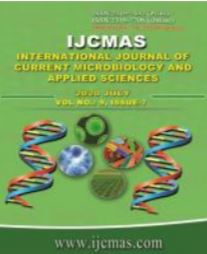


 National Academy of Agricultural Sciences (NAAS)
National Academy of Agricultural Sciences (NAAS)

|
PRINT ISSN : 2319-7692
Online ISSN : 2319-7706 Issues : 12 per year Publisher : Excellent Publishers Email : editorijcmas@gmail.com / submit@ijcmas.com Editor-in-chief: Dr.M.Prakash Index Copernicus ICV 2018: 95.39 NAAS RATING 2020: 5.38 |
Due to advent of private seed companies with the liberalization of seed trade in 1988, the public sector seed corporations have started declining and becoming inept. With an objective of developing an alternative seed production system to compete private sectors, the University of Horticultural Sciences, Bagalkot in Karnataka implemented Scientists-Farmers Participatory Mode (SFPM) of vegetable seed production in selected villages. A group of farmers were selected at hobali level and were supplied the foundation seeds of new promising public varieties to an extent of 0.4 ha. And two to three training programmes were conducted in targeted villages for quality seed production. The seeds produced by the target group was processed and packed scientifically in the university seed processing unit and arranged for distribution to the farmers at affordable price. By this new innovative and modified system of seed production the university could be able to replace old varieties and farmer saved seeds of onion, chilli and drumstick in this region. The University of Horticultural Sciences, Bagalkot produced 3029 kg, 743 kg and 12826 kg of chilli, drumstick and onion seeds of new public varieties under Scientist’s-Farmer’s Participatory Mode Programmes respectively during 2014-15, 2015-16 and 2016-17. From this new alternate model of seed system, there should be large scale promotion of regional seed system involving farmers, NGO and voluntary organization for quick and effective replacement of old, low yielding and disease susceptible varieties with new high yielding, disease resistance for enhanced food production and food security.
 |
 |
 |
 |
 |